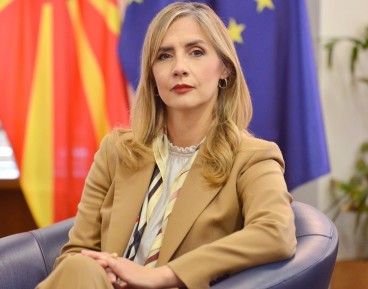Our banking system is still in good condition
Category: Wideo
Grzegorz Jeż, Obserwator Finansowy: I would like to ask you a question concerning the eurozone. Croatia as a country has just joined the eurozone. What were the reasons behind that decision?
Sandra Švaljek: First of all, let me thank you for having me here and for this privilege of being in the beautiful city of Toruń. Yes, I would like to talk a little bit more about the background of Croatia’s euro accession. And, as you rightly said, Croatia acceded the eurozone on the 1st of January 2023. Actually, it also entered the Schengen zone, which is another very important milestone for Croatia. And as for the eurozone accession, we had prepared very well for it, the preparations started already in 2017 and it was our goal to enter the eurozone as swiftly as possible. Croatia joined the EU in 2013 and until 2017 it was almost impossible for us to start preparing for eurozone accession because previously we had quite a long recession and the macroeconomic indicators were not good. There were several macroeconomic imbalances, so Croatia was in this macroeconomic imbalances procedure and actually it also had quite a large fiscal deficit and fiscal debt. But once we were able to stabilise our economy, actually we decided to start preparing for entering the eurozone. And actually we have many reasons why that was our economic goal. First of all, Croatia is very deeply integrated with EU countries, which are the larger proportion of our exports going to the European Union countries and eurozone countries. The majority of our tourists come from eurozone countries and Croatia is also a very highly euroised country. And that was one of the most important elements for this decision. Of course, we have seen many benefits of joining the eurozone, because the Croatian economy has business cycles that are very synchronised with the ones of the eurozone, meaning that eurozone monetary policy fits Croatia and the Croatian economy very well, as well.
So can we say that to some extent Croatia so far has been a country of two different currencies: your local kuna and the euro, because, as we have just mentioned, you were euroised during the previous year? So it was a strong argument to join since de facto you had been using the euro for several years, right?
Yes, that is true. We have had the kuna, our local currency, since 1994 and the kuna has served us quite well. We had stable prices during that 30-year period. However, Croatia was, in spite of that, a very euroised country, meaning that the majority of our deposits were either in euros or indexed to the euro, and the majority of loans were indexed to the euro or in euros, and if you look at Croatia’s overall debt – the debt of all the sectors: households, enterprises and the state – 70 per cent or even more than 70 per cent of all the country’s debt was in euros. So that to some extent hampered the possibility to conduct independent sovereign monetary policy, because we could not use the exchange rate policy as an instrument of economic policy since any devaluation of the currency would immediately translate into a higher debt expressed in the local currency. So with devaluation by 10 per cent actually in nominal kuna terms our debt would increase by 10 per cent of GDP.
There were some concerns about price increases. Have they come true? What’s your angle on that? Because I’ve read some articles about some people complaining about price increases.
During our preparation for euro adoption we actually knew that the biggest threat coming with the euro is the rise in prices. Actually we have run many surveys among the Croatian population and actually their biggest concern was that prices would go up dramatically after the euro adoption. And that is somehow related, not to the solid data, the statistics on price developments in countries that previously adopted the euro, but it mostly has to do with anecdotal evidence, with what people in those countries were mentioning or what the media were mentioning. We knew that according to statistical data the prices in countries that adopted the euro before Croatia rose by 0.2-0.4 per cent after the euro adoption. And we expected the prices to increase more or less in the same range in Croatia. However, since we are living in a period of heightened inflation, we feared that the prices might go up a little bit more than in countries that previously adopted the euro. However, when we received the data for January, it turned out that inflation went down compared to December 2022 and when we disentangled the price developments in January compared to December, we saw that the prices went up in the area of services. According to our calculations, the prices of services went up by 0.4 percentage points above the average for January. And that is the price increase that we attribute to euro adoption. So we might say that the price increase solely due to the euro adoption is more or less as we expected. So 0.3-0.4 per cent higher that if we had not introduced the euro.
They were rounded up, right?
They were rounded up. Especially in the services sector, since there is quite a pronounced demand for services, the prices went up a little bit more than only due to rounding.
How can we sum up the tenth year of membership of Croatia in the European Union? What’s your opinion? What was good? Are there any problems with membership? What do you think?
I would say that now almost ten years after entering the European Union our economy is much more solid and stable than it was before. If you look at macroeconomic indicators, at the data, the most important improvement you’ll see was in the trade area, because merchandise exports went up, actually they doubled in comparison to 2012, for example. Also the trade in services went up by some three quarters, 75%. Many would probably think that it’s only due to tourism.
Yes, my first association would be like that. That due to tourism there are stronger ties, but the problem is that you joined the Schengen zone later. What was the reason then?
So the trade in services went up because there were investments in tourism and in spite of the fact that we did not have the euro as the local currency and we were not part of the Schengen zone, we were attractive for tourism. However, we entered the Schengen zone on the 1st of January this year and we think that it might give an additional boost to tourism. But I wanted to say that not only the figures in tourism went up, but also in other services like IT services, business services and so on. And in general trade openness improved. Many would also say that the main benefit of entering the European Union was the money from EU funds. Well, I think it’s not negligible. It’s a very substantial amount of money and it covers some 80 per cent of all public investments. However, I would say that the main advantage of being an EU member is that it gives you additional motivation to do the reforms. Even now, when we had to apply for the eurozone, we had to fulfil some precommitments, the commitments after joining the ERM-2, the Exchange Rate Mechanism, which actually gave us an additional reason to implement the reforms. Therefore, we are a more solid economy than we were before entering the European Union and now the eurozone.
The interview was held on the 20th of February 2023.


